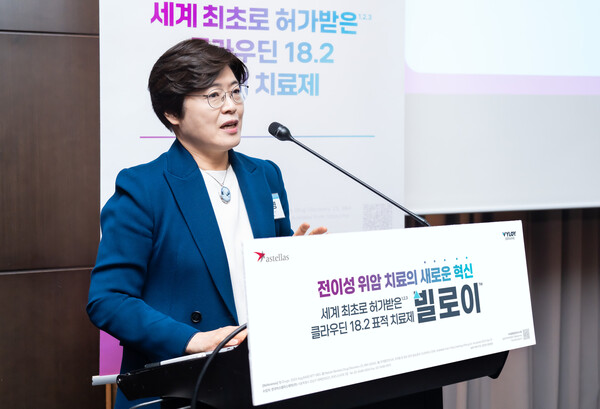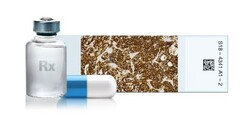Astellas’ gastric cancer drug Vyloy (zolbetuximab) is set to launch in Korea in less than three weeks, but a regulatory roadblock is already limiting patient access.
On Wednesday, the Health Insurance Review & Assessment Service (HIRA) rejected Vyloy’s first reimbursement bid, leaving advanced gastric cancer patients without insurance coverage for what would be the first HER2-negative targeted therapy in 14 years.
Two days later, at a press conference hosted by Astellas Korea, Rha Sun-young, Chairperson of the Stomach Cancer Committee at the Korean Cancer Study Group, warned that the rejection effectively cements Keytruda (pembrolizumab) as the only reimbursed first-line option for patients with a PD-L1 combined positive score (CPS) of 10 or higher—despite growing evidence suggesting Vyloy could offer a more effective alternative for certain cases.

“With what we’re seeing in emerging data, Claudin 18.2 (CLDN18.2)-positive patients—especially those with high expression—could do better with Vyloy,” said Rha, who is also a professor of medical oncology at Yonsei University College of Medicine. “But with Keytruda now officially reimbursed, it’s the default. That’s the reality.”
The press conference marked the countdown to Vyloy’s March 3 market debut, setting the stage for continued regulatory battles over reimbursement and patient access.
The rejection wasn’t entirely unexpected. Korea’s Ministry of Food and Drug Safety tends to mirror global precedents, and with other major markets still finalizing reimbursement, Rha noted that regulators may have been reluctant to move first.
But she emphasized that Vyloy fills a critical gap. “Keytruda has shown efficacy in PD-L1 CPS ≥10 patients, but its role in lower PD-L1 cases is less certain,” she said. “Vyloy, which targets CLDN18.2, could provide a crucial alternative for HER2-negative gastric cancer patients who have historically had limited treatment options.”
Vyloy’s approval was backed by two phase 3 trials, SPOTLIGHT and GLOW, which showed clear survival benefits for CLDN18.2-positive patients. In SPOTLIGHT, Vyloy extended median progression-free survival (PFS) to 10.6 months, compared to 8.7 months with placebo, and overall survival (OS) reached 18.2 months, up from 15.5 months. The GLOW trial reported similar gains. Notably, Asian patients showed even stronger responses, with survival times exceeding those seen in non-Asian groups.
With reimbursement stalled, Astellas is turning to real-world data to push its case. Since July 2024, its Expanded Access Program (EAP) has provided Vyloy treatment to 51 patients across 10 Korean hospitals. The company expects this data to strengthen its next reimbursement submission by the end of the year.
“We need at least five to six more months of real-world data before resubmitting,” said Professor Lee Hye-seung of pathology at Seoul National University Bundang Hospital.
Astellas Korea General Manager Kim Jun-il confirmed that the company is “actively discussing the matter with HIRA to clarify the reasons behind the rejection” and is preparing to resubmit “as soon as possible.”
But even if Vyloy secures reimbursement, hospitals may struggle to access the companion diagnostic (CDx) test needed to prescribe it.
Reimbursement snag could limit access to Vyloy’s required diagnostic test
In Japan, CLDN18.2 testing was fully covered from the start, with nearly 200 laboratories offering the test. Korea, despite having the fourth-highest gastric cancer rates globally, placed it under Level 1 general IHC reimbursement—making it financially restrictive for hospitals.

To qualify for Vyloy, patients must first undergo CLDN18.2 IHC testing using Roche Diagnostics' VENTANA CLDN18 (43-14A) RxDx Assay. But in Korea, HIRA has opted to keep the test at general IHC pricing instead of classifying it as a Level 2 CDx, which would offer higher reimbursement.
Until Vyloy itself is reimbursed, Lee said the test remains undervalued, adding financial strain on hospitals and laboratories. The price difference between Level 1 and Level 2 is approximately 20,000 won ($14).
Lee warned that without proper reimbursement, hospitals might resort to cheaper, non-standardized tests, increasing the risk of false-negative results. “If hospitals cut costs by using non-validated antibody reagents, patients who should qualify for Vyloy could be misclassified and miss out on treatment,” she explained.
Unlike HER2 or EGFR, CLDN18.2 is not a tumor driver but a biomarker for treatment selection. Any inconsistency in test accuracy could directly impact a patient’s access to the drug.
“The difference between a CLDN18.2 positivity score of 74 percent versus 75 percent is the difference between qualifying for Vyloy or not,” Rha pointed out. “Misclassifications could mean patients are denied effective treatment.”
Physicians are pushing for HIRA to reclassify CLDN18.2 testing as a Level 2 CDx immediately, rather than waiting for Vyloy’s reimbursement to be finalized. In Japan, reimbursement for the test and the drug came as a package, ensuring hospitals could provide standardized, high-quality testing without financial constraints. But in Korea, the misclassification of the test has created institutional barriers, leading some hospitals to hesitate in offering it altogether.
“Pathologists are performing the test at a loss right now, but they continue because they know it helps patients,” Lee said. “Reimbursement for both the drug and the diagnostic test must be resolved to ensure patients aren’t left behind.”
The broader issue is Korea’s historically slow adoption of biomarker-driven therapies. While lung cancer survival rates have more than doubled thanks to targeted treatments, gastric cancer lags behind due to a lack of available drug targets. Roche's HER2-targeted therapy Herceptin (trastuzumab) has been around for 15 years but benefits only 15 percent of patients. Immunotherapy works in just 10 percent of HER2-negative cases. Until now, the remaining 75 percent of patients had no effective targeted treatment.
Vyloy was supposed to change that. With CLDN18.2 expressed in about 40 percent of gastric cancer cases, it’s the first new targeted therapy for HER2-negative patients in over a decade. But until HIRA revisits its decision, thousands of Korean patients remain in limbo—waiting for access to a drug that could change their prognosis.
Related articles
- Vyloy’s 1st attempt at reimbursement failed, and its diagnostic issue was also half-resolved
- Keytruda gets expanded coverage for 11 indications at cancer disease panel
- Patient group urges faster access to Vyloy by reforming diagnostic rules
- Will revised gastric cancer clinical guidelines address Vyloy’s diagnostic gap?
- Astellas Korea wins approval for Claudin 18.2-targeted gastric cancer therapy
- Vyloy pioneers new era in metastatic gastric cancer treatment with Claudin 18.2 targeting
- Astellas Korea names ex-Novartis exec Kang as head of medical affairs
- Korean researchers 1st in Asia to link Lynch syndrome to gastric cancer
- 'Vyloy took targeted treatment for stomach cancer to higher level’
- Korean Cancer Association to expand role as policy-clinical-public health bridge
- Astellas Korea appoints ex-Daiichi Sankyo exec as market access head
- Astellas Korea renews bid to reimburse targeted gastric cancer drug Vyloy

